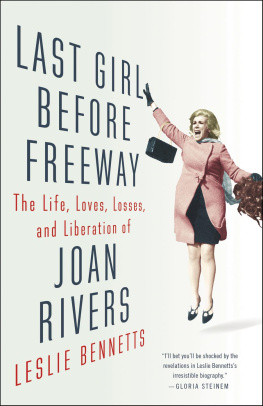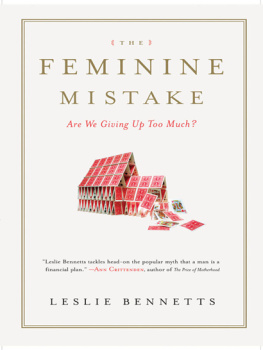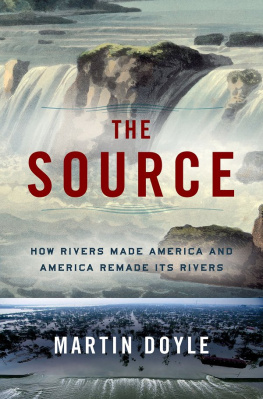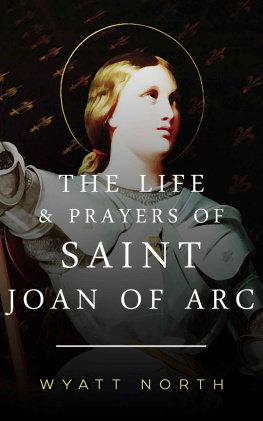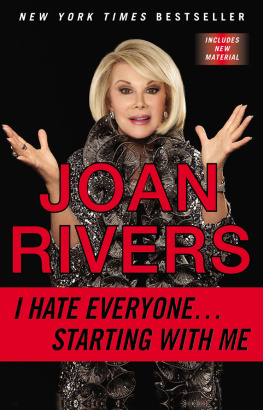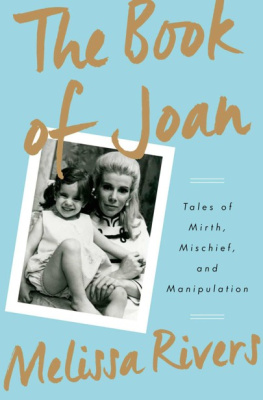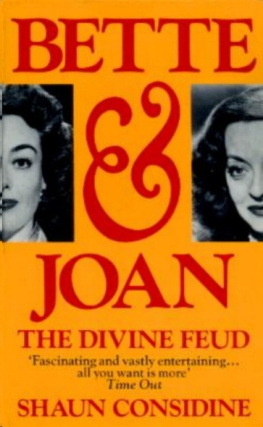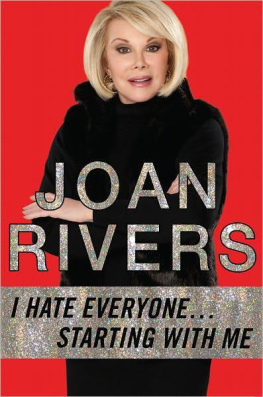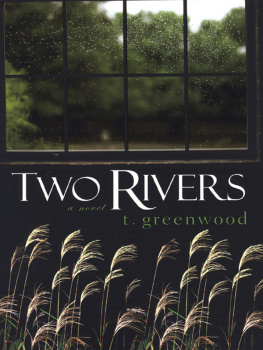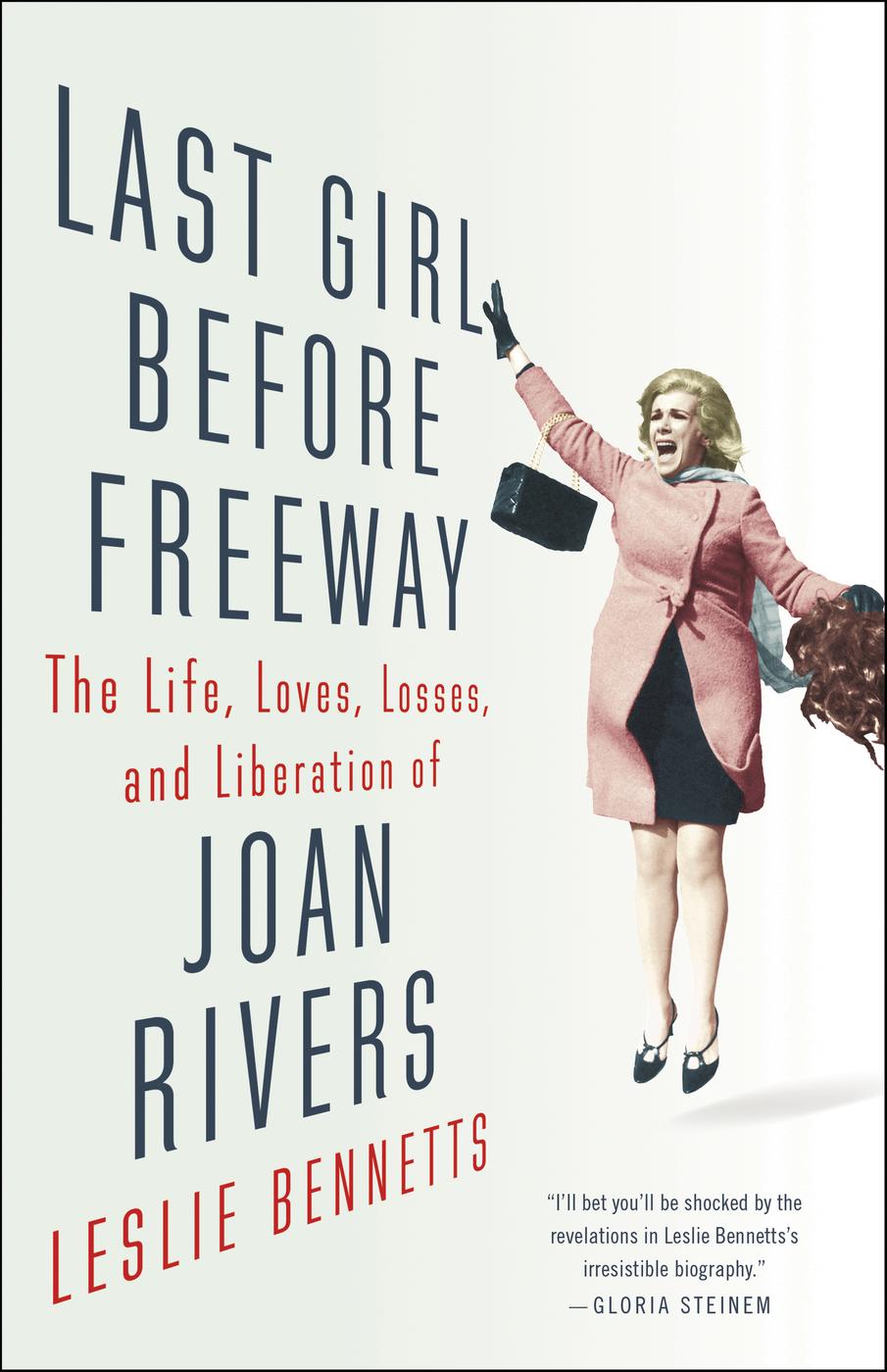This book is dedicated to everyone who has lost love or work or money or success or youth or beauty or hope: may Joans indomitable spirit encourage you in your bleakest hours, inspire you to triumph over any odds, and remind you to keep your sense of humor along the wayas it has done for me.
S he sat on the bed, the gun in her lap. Everything seemed hopeless. Whats the point? she thought. She couldnt think of one.
Only a few months earlier, Joan Rivers had everything she ever wanted: fame and fortune, the job of her dreams, a loyal husband, a loving child, a lavish estateand a future that beckoned with enticing possibilities. After years of struggle, she had not only succeeded as a comedienne but had made history as televisions first and only female late-night talk show host.
And now shed lost it all. The first lady of comedy was fired from her job and publicly humiliated. Her husbandunable to bear his own failure as her manager and producerkilled himself. Their daughter blamed her mother for his death.
Reeling with grief and rage, Rivers then discovered she was broke. She had earned millions of dollars and lived a life of baroque luxury, but her husband had squandered her wealth on bad investments. She was $37 million in debt, and her opportunities for making more money had vanished.
At the Bel Air mansion where five telephone lines once buzzed relentlessly, the phone never rang. Nobody wanted to hire her as an entertainer. Suicide wasnt funny, and her husbands tragic death turned her into a professional pariah. Even her social life evaporated. No one invited her to anything.
As her fifty-fifth birthday approached, she couldnt see any reason to keep on living. It was hard enough for young women to succeed in show business, but for an aging has-been, resurrecting a ruined career seemed impossible. Her home once sheltered a happy family; now the rooms echoed with silence. In her fancy peach-colored bedroom, she was alone.
This is stupid, she thought.
And then her Yorkshire terrier jumped onto her lap and sat on the gun. Rivers knew her way around firearms; she often packed a pistol, and she felt no hesitation about using it. Once, when an assistant accidentally surprised her in the middle of the night, Rivers thought she was an intruder and accosted her with trigger cocked. Your times up, she said calmly, ready to fire.
Maybe that was the answer now: one moment and the act would be done.
But then a terrible thought occurred to her: If she killed herself, what would happen to Spike? The diminutive Yorkie was very cute, but he was also mean and cantankerous. He didnt like anybody but his mistress, and he was ridiculously spoiled; his favorite food was a rare roast beef sandwich, no mayo or mustard. Joans daughter referred to him as a tall rat.
Without Joan, who would protect and pamper the tiny dog she loved so much?
Nobody will take care of him! she realized, aghast.
As she sat on her bed, staring down at the gun, no oddsmaker would have bet on Riverss future. In the history of show business, no middle-aged woman had ever done anything remotely comparable to what she was about to do.
But Rivers didnt shoot herself, and she refused to give up and slink into oblivion. Written off as a lost cause, she started over, invented new opportunities for herself, and went on to achieve the impossible. Working with maniacal fervor through her sixties and seventies and into her eighties, she re-created herself as a cultural icon, a vastly influential trailblazer, and a business powerhouse who built a billion-dollar company.
In the process, she rewrote her entire life story. Raised to believe in the classic fairy tale of happily ever after, she had been desperate to find the requisite husband. When she finally got married at thirty-two, she was overjoyed to have a loyal helpmate who looked like the black-suited groom on a wedding cakeand even more thrilled when baby made three.
In her thirties and forties, Rivers achieved her very own, uniquely modern version of the American dream, a forward-looking combination of classic male goals and conventional female aspirations. Like a successful man, she earned wealth and fame, but she also had a happy familythe Good Housekeeping seal of approval for any woman, no matter how accomplished.
Together, Rivers and her husband created a marital mythology that enshrined her as the star but credited him as the essential power behind the throne. But as the years went on, appearance diverged from realityat first by a little, and then, terrifyingly, by a lot. Unable to keep up with his voraciously ambitious wife, the man in charge became increasingly depressed about his own lack of success. Instead of elevating her to the heights she craved, Mr. Right ended up playing the pivotal role in taking her down.
When she had to start again in midlife and go it alone, reality forced her to embrace a very different narrative. Her steady climb to the top had turned into a dizzying roller-coaster ride that ricocheted between spectacular triumphs and soul-crushing failuresa Dickensian saga of alternating extremes that included deep loves and tragic losses, stinging betrayals and enduring devotion, agonizing rejections and the adulation of millions, economic terror and riches beyond the wildest imaginings of all but the rarefied few.
None of it was what she expected. She grew up chubby and plain, with drab hair and thunder thighs and a horsey face that remained resolutely unpretty even after the requisite nose job. Fiercely jealous of Elizabeth Taylor, only a year older but a movie star even as a child, Rivers never got over her anger that she herself wasnt beautiful.
But that seeming handicap proved far less important than she assumed. Throughout her life, Rivers believed that beauty was the key to womens happiness and successand yet talent and ambition gave her rewards that far exceeded anything earned by the pretty girls she envied so bitterly.
She thought she needed a man to prop her upbut when she finally took charge of her own life, she became much more capable than the men she depended on. Convinced that a womans worth is measured by the intensity of mens desire, she saw aging as the ultimate enemyand yet she achieved her greatest renown long after passing the sell-by date society decrees to be the expiration of female sexual viability.
In her later years, Rivers claimed that Spike saved her life when he sat on her gun that day, but in truth her fate was preordained by the fanatical determination she always recognized as the core of her identity. Even in my darkest moments, I knew instinctively that my unyielding drive was my most important asset, she wrote.
That drive inspired her philosophy of life, which was as ferocious as it was uncompromising: Never stop believing. Never give up. Never quit. Never!
And she never did. After her life fell apart, it took her years to dig her way out of the wreckage. The process was hard and humbling, but it ultimately produced an outcome that no one, not even Joan herself, could have foreseen.
When she died at eighty-one, she was, improbably and amazingly, at the height of her famenot only as a comic who battled her way back from oblivion, but as an insatiable overachiever who had fought her way into a dozen other fields as well.
After a sixty-year career, she was still doing stand-up comedy every week of her life, but she had also been an Emmy Awardwinning talk show host; a radio host; a reality star online and on TV; the best-selling author of memoirs, fiction, and self-help books; a playwright and a screenwriter; a film star and a Tony-nominated actress on Broadway; a Hollywood movie director; a Grammy Awardwinning recording artist; a CEO and designer whose company sold more than a billion dollars worth of jewelry and clothing on QVC; and a philanthropist who commenced her enduring support of AIDS patients at a frightening time when that commitment was a rare act of public bravery.

